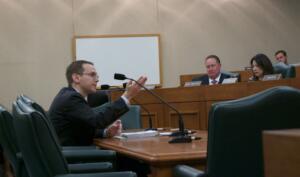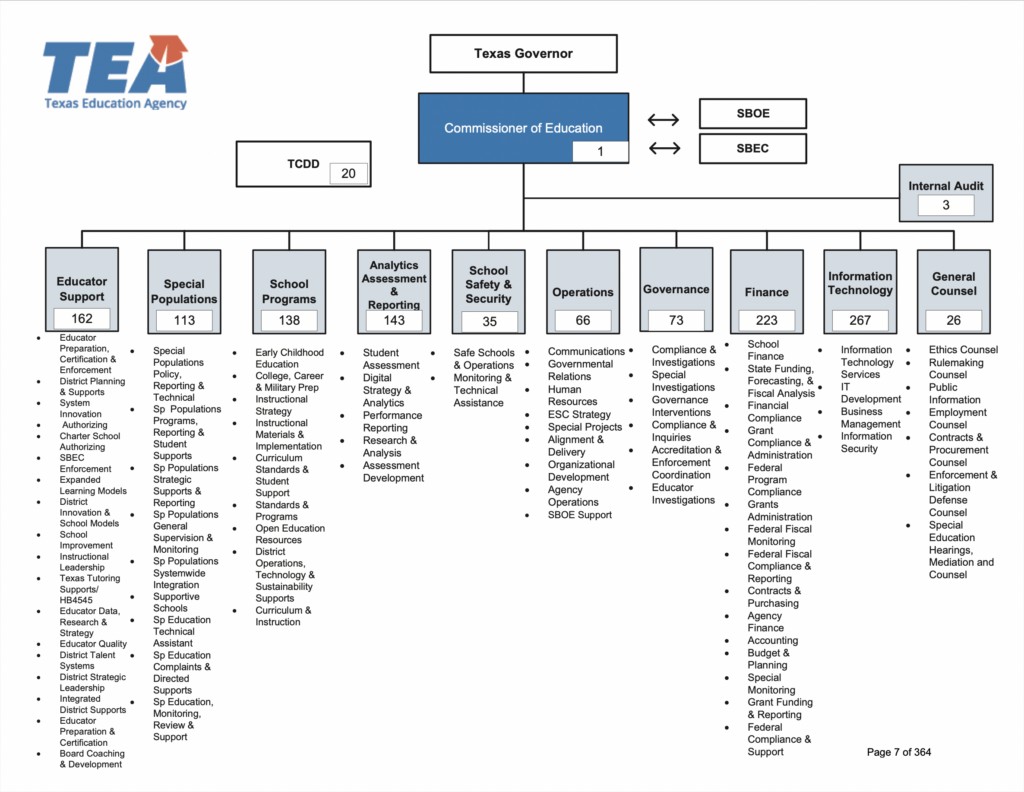The Texas Education Agency (TEA) is the state agency responsible for overseeing public education in Texas. It oversees more than 1,200 school districts and charter schools throughout the state.
Although public school districts are independent governmental entities, TEA has the authority to set certain standards, require certain reports, and take over a district’s operations if serious issues arise, such as poor standardized test performance or financial mismanagement.
TEA works alongside the State Board of Education to set policies and academic standards for public schools. However, school districts also have some freedom to decide on their own curriculum and textbooks.
Functions
Key functions of the TEA include:
- Administering Education Policies: TEA enforces policies set by the Texas Legislature and the State Board of Education, ensuring compliance with state laws and regulations.
- Funding Distribution: The agency allocates state and federal funds to school districts, managing the funding formula to ensure fair distribution.
- Accountability and Assessment: TEA oversees the state’s accountability system, including standardized testing like the STAAR, and monitors school performance to ensure academic standards are met.
- Support for Districts: The agency provides training, resources, and guidance to help school districts meet state standards and improve educational practices.
- Educator Certification and Standards: TEA sets and enforces certification requirements for educators, ensuring they meet professional standards to deliver quality instruction.
- Promoting Equity: The agency works to ensure all students have access to quality education, focusing on special education, English language learners, and economically disadvantaged students.
- School Improvement: TEA intervenes in underperforming schools, providing support or management to help improve student outcomes.
Through these functions, TEA provides statewide oversight and support for the largely locally managed Texas school system.
Agency Structure
The TEA is headed by the Commissioner of Education, who is supported by deputy and associate commissioners, division directors, and agency staff. The current commissioner is Mike Morath, a former member of the Dallas public school board.

TEA divisions include:
- Academics
- Accountability Research
- Accreditation
- Charter School Administration
- Dropout Prevention and College and Career Readiness
- Educational Technology
- Educator Certification
- Financial Compliance
- Legal Services
- School Governance.

TEA also operates 20 Regional Education Service Centers, which support school districts and charter schools to improve student performance, operate more efficiently, and implement state-mandated initiatives. Regional Services Centers employ instructional coaches, autism specialists, dyslexia specialists, behavior interventionists, health and safety advisors, and other specialists.

Powers of Oversight
The Texas Education Agency (TEA) accredits all public school districts in Texas and charter schools. It publishes an annual A-F “report card” system. This provides a rating of each school and school district based on criteria like performance on standardized tests.
ISDs file both academic and financial accountability reports to the TEA. The state runs a school financial accountability rating system, which checks on the quality of financial management practices at independent school districts.
When schools are underperforming, the state education commissioner has the power to appoint special monitors or a board of managers to take over the operations of the district. If this happens, TEA’s Governance and Investigations Division is responsible for the selection, training, and placement of monitors and conservators in a school district.
Permanent School Fund
The Texas Education Agency jointly administers the Permanent School Fund with the General Land Office. The fund’s financial assets are managed by TEA while the fund’s land, mineral rights, and certain real estate assets are managed by the GLO.
The fund, established 1854, is an important part of the state’s overall school finance system. It derives its revenues largely from leases of public land to oil and gas companies and distributes the proceeds to public school districts.
Distributions to public school districts are made in proportion to their average daily student attendance, among other factors.



